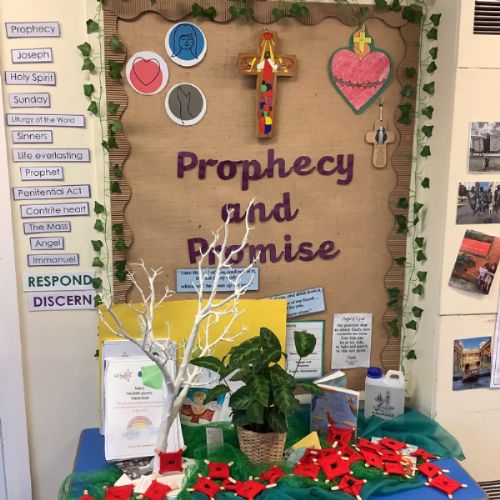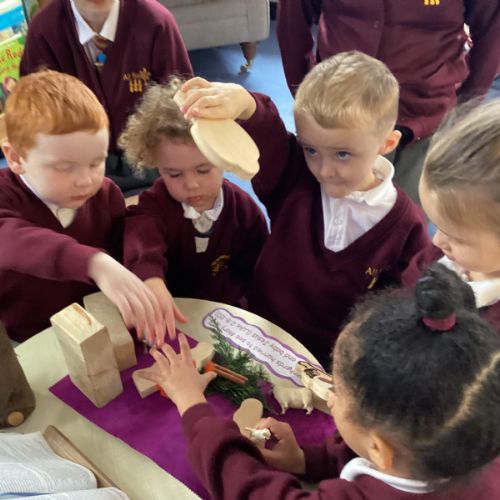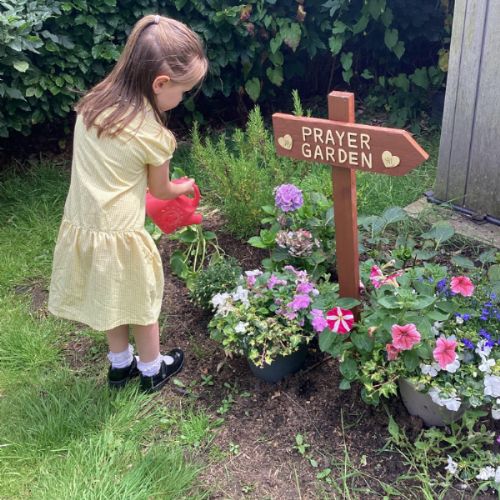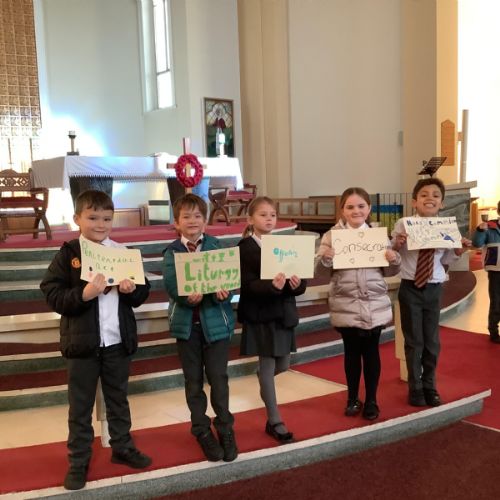Religious Education
"To Know You More Clearly."
"Education is not about knowing things or taking lessons but about being able to use three lingos: those of the head, the heart, and the hands... learning so that you can think about what you feel and do, can feel what you think and do, and can do what you feel and think. Unity within a person."
– Pope FranciS
All Saints’ was described as an “Outstanding Catholic school where everyone receives a warm welcome” during our last RE inspection (274019). The inspector went on to say “The Pupils show great respect for one another, to adults around them and to visitors to the school. Their behaviour is outstanding. They show high levels of religious literacy and are able to show a mature attitude to sensitive issues.”
The Aims of Religious Education:
At All Saints’, we understand Religious Education to be the systematic study of the mystery of God, of the life and teachings of Jesus Christ, the teachings of the Church, the central beliefs that Catholics hold, the basis for them and the relationship between faith and life;
- to enable pupils to continually deepen their religious and theological understanding and be able to communicate effectively;
- to present an authentic vision of the Church’s moral and social teaching; to provide pupils with a sure guide for living and the tools to critically engage with contemporary culture and society;
- to give pupils an understanding of the religions and world views present in the world today and the skills to engage in respectful and fruitful dialogue with those whose world views differ from their own;
- to develop the critical faculties of pupils so to bring clarity to the relationship between faith and life, and between faith and culture;
- to stimulate pupils’ imagination and provoke a desire for personal meaning as revealed in the truth of the Catholic faith;
- to enable pupils to relate the knowledge gained through religious education to their understanding of other subjects in the curriculum
Curriculum Intent
At All Saints’ school, we will foster the growth of faith by providing a caring, secure and stimulating learning environment which: values the contribution of each individual; promotes the love of God and of one another and of a life in which we are fulfilling our mission statements.
We will provide opportunities to help our children develop the skills and capacities necessary to become reflective and questioning individuals and to promote knowledge and understanding of the Catholic faith.
Religious Education permeates all that we do at All Saints’. It is at the heart of our curriculum as we strive to live and proclaim the Gospel values. In proclaiming the Gospel message, we endeavour to share the Gospel spirit of love in all that we do. We teach that ‘God is love’ but our understanding of this concept can only grow from our own experiences of kindness, forgiveness and working together. Therefore, every effort is made to create, in our school and in our classrooms, a community where the children know they are loved and feel confident and secure.
Through our teaching of Religious Education, we endeavour to enrich the lives of the individuals in our school.
Religious Education is a core subject in our Catholic school and because of this it is planned, taught, assessed and monitored with the same rigour as other curriculum subjects.
Our Catholic Social Teachings, bespoke to All Saints’ but inspired by the Church, runs through our curriculum. The spiritual, moral, social and cultural development of each child is addressed through all aspects of the curriculum as well as through everyday school life.
We see our role, in partnership with parents, in leading their children to a greater understanding of who God is and developing a deeper faith.
’RE plays a central and vital part of the faith of the Catholic School. At the heart of Catholic Education is the Christian vision of the human person. RE is never simply one subject amongst many, but the foundation of the human process.’ (Bishops’ statement 274000)
At All Saints’, we believe that ‘The primary purpose of Catholic Religious Education is to come to know and understand God’s revelation, which is fulfilled in the person of Jesus Christ… In the person of Christ, the deepest meaning of what it is to be human — that we are created by God and through the Holy Spirit united with Christ in his Incarnation — is discovered. This revelation is known through the scriptures and the tradition of the Church as taught by the Magisterium. Religious Education helps the pupil to know and experience the meaning of this revelation in his or her own life and the life of the community which is the Church.’( Bishops’ Conference, 274000)
For some in the classroom, Religious Education may well be received as catechesis, deepening and enhancing their personal faith; for some it will be evangelisation, the first time they will have been presented, personally, with the truths of living faith. Nevertheless, its primary purpose is the step-by-step study of the mystery of Christ, the teaching of the Church and its application in daily life. The criteria by which it is to be judged are educational. ( Bishops’ Conference, 274000)
The outcome of Religious Education is religiously literate and engaged young people who have the knowledge, understanding and skills – appropriate to their age and capacity – to reflect spiritually, and think ethically and theologically, and who are aware of the demands of religious commitment in everyday life. (Religious Education Curriculum Directory p6)
Curriculum Implementation
R.E. is a core subject in our school, alongside English, Maths and Science, and therefore we devote 10% of our curriculum time to its delivery. At All Saints' Religious Education is carefully planned and delivered to reflect our deep commitment to nurturing faith, love, and understanding in every child. Our teaching is rooted in the RED (Religious Education Directory) and we have gradually introduced this through The Vine and the Branches scheme. As a school dedicated to shaping high-quality RE, we were proud to volunteer as a pilot school for the new RED scheme in 27402743 in year groups one and three. This early involvement has enabled us to embed the curriculum with confidence, ensuring a rich, progressive and theologically sound RE experience. Planning is detailed and there is a sharp focus on knowing and understanding religious vocabulary. Teaching ensures that there are regular planned opportunities to re-visit, review and consolidate prior learning. In classrooms, you will see RE working walls displaying key vocabulary and current learning. There is a consistent approach to re-visiting learning from previous units throughout the school. Lessons are thoughtfully sequenced, incorporating scripture, liturgy, doctrine, and Catholic social teaching, while encouraging critical thinking, spiritual reflection, and active engagement with faith in action.
This academic year, all children will be taught using 'The Vine and Branches'.
The ways of knowing describe the skills that pupils develop as they progress through the religious education curriculum. We refer now to ways of knowing rather than standards or levels, since progress in religious education is not only something that concerns performance and summative assessment. They are called ways of knowing since they describe the holistic ways human beings experience education: as a growth in understanding, as a creative and critical assimilation, and as a recognition of the application of learning to one’s own life. The three ways of knowing are ‘understand’, ‘discern’, and ‘respond’.
Curriculum Impact
At All Saints’ Primary School, the teaching of Religious Education (RE) enables pupils to acquire a deep and meaningful understanding of faith, identity, and the diverse world around them. The impact of our RE curriculum is reflected in the way children grow in their knowledge, empathy, and ability to articulate their thoughts respectfully and confidently.
Development of Knowledge, Skills and Concepts
Pupils progressively build their understanding of religious beliefs, practices, and worldviews, fostering a respectful appreciation of the different ways people live and express their spirituality. Through engaging and reflective learning experiences, children explore key theological concepts and are encouraged to make connections between religious teachings and their own lives. This supports them in developing critical thinking, informed discussion, and the ability to reflect on moral and spiritual questions.
Personal, Social and Cultural Awareness
RE helps our children develop a strong sense of identity and belonging by making meaningful links between their own experiences and the lives of others—both within the school community and globally. By exploring a range of religious and non-religious world views, children grow in their cultural awareness and emotional intelligence, becoming more compassionate, open-minded and respectful individuals.
Assessment and Evidence of Impact
The impact of RE learning is monitored through lesson observations, pupil voice, and regular book scrutiny. However, the evidence of pupil understanding goes beyond written work. Children demonstrate their learning through creative expression—such as art, drama, and role-play—as well as through discussions and personal reflections. This holistic approach ensures that all pupils are able to access and express their RE learning in a way that is meaningful to them.
Collaborative Enrichment and Shared Practice
We value the strength of collaboration and regularly work in partnership with other schools, particularly those within our parish community. This allows us to share excellent practice, enrich our curriculum provision, and ensure consistency and high standards across settings. Through these shared experiences, our children are empowered to fulfil their spiritual, moral, and academic potential.
Leadership of Religious Education
Religious Education is the responsibility of the R.E. Lead and the Headteacher with support from Key Stage Leaders. Their role is to monitor and assess the R.E. curriculum and Catholic prayer and liturgy throughout the school to ensure continuity and progression. They also ensure that the aims and learning outcomes in the Curriculum Directory are identified and fulfilled. A link governor has specific responsibility for R.E. and liaises closely with the staff of the school to fulfil their monitoring duties. 

The Role of the Lead for Religious Education
The Religious Education Lead will be responsible for:
- Working with senior leaders and monitoring teaching and learning, planning and standards through lesson observations and work scrutinies according to school practice.
- Organising in-house moderation of standards meetings.
- Self-evaluation to identify strengths and areas for development.
- Ensuring the curriculum offered is appropriate, suitable and relevant to pupils’ needs and interests.
- Attending appropriate training and keeping up to date with current thinking, policy and developments and feeding back to staff.
- Organising and leading in-house staff training and development.
- Identifying training needs of staff to ensure their suitability to teach effective Religious Education.
- Supporting and advising colleagues in the delivery of Religious Education.
- Liaising with the Headteacher, Governors, parents, the Education Service on matters relating to Religious Education.
- Auditing, managing and developing resources within a given budget.
Curriculum Content
R.E. is a core subject in our school, alongside English, Maths and Science, and therefore we devote 10% of our curriculum time to its delivery. We follow To Know You More Clearly – The Religious Education Directory for Catholic Schools and Academies in England and Wales (27402743), which sets out the purpose, structure, and outcomes for Catholic Religious Education. This framework ensures a rigorous, systematic, and cohesive approach to the study of the Catholic faith from Nursery through to Year 6.
The Directory states that Catholic Religious Education must:
- Enable pupils to know and understand the faith into which they have been baptised.
- Form pupils in the virtues that will foster life in Christ and prepare them to serve the Church and wider society.
- Present the essentials of Catholic teaching at an appropriate level from the earliest years, growing in depth and complexity as pupils progress.
- Inspire pupils to integrate faith and life, making the Christian message central to their personal development.
Our programme is supported by the Vine and the Branches scheme of work, which provides structured teaching sequences, ensuring pupils encounter Scripture, Tradition, and the living faith of the Church in a way that is engaging, age-appropriate, and progressively deepened.
The Catechism of the Catholic Church
The Catechism of the Catholic Church provides an authoritative summary of Catholic doctrine and is a vital resource for teachers in planning and delivering high-quality Religious Education. While not a pupil text, the Catechism supports teachers’ theological understanding and confidence. Its comprehensive index of topics enables staff to deepen their own knowledge of the faith, ensuring that lessons are firmly rooted in the teaching of the Church.
Teachers are encouraged to:
- Refer to the Catechism when preparing lessons.
- Use its structure to connect classroom teaching to the wider unity of Catholic belief.
- Draw on it for personal formation, enabling them to witness to the faith with clarity and integrity
Planning
Before each topic, every teacher looks at the aims, understanding and learning intentions of the theme and topic and plans accordingly. Lessons may also incorporate important dates in the Liturgical Calendar. A copy of the plan is given to the RE coordinator on request for monitoring and observation to ensure continuity and progression throughout the topics covered.
In each classroom there is an area which displays religious topics covered at that time of year. There are also Religion displays in the foyer and school corridors.
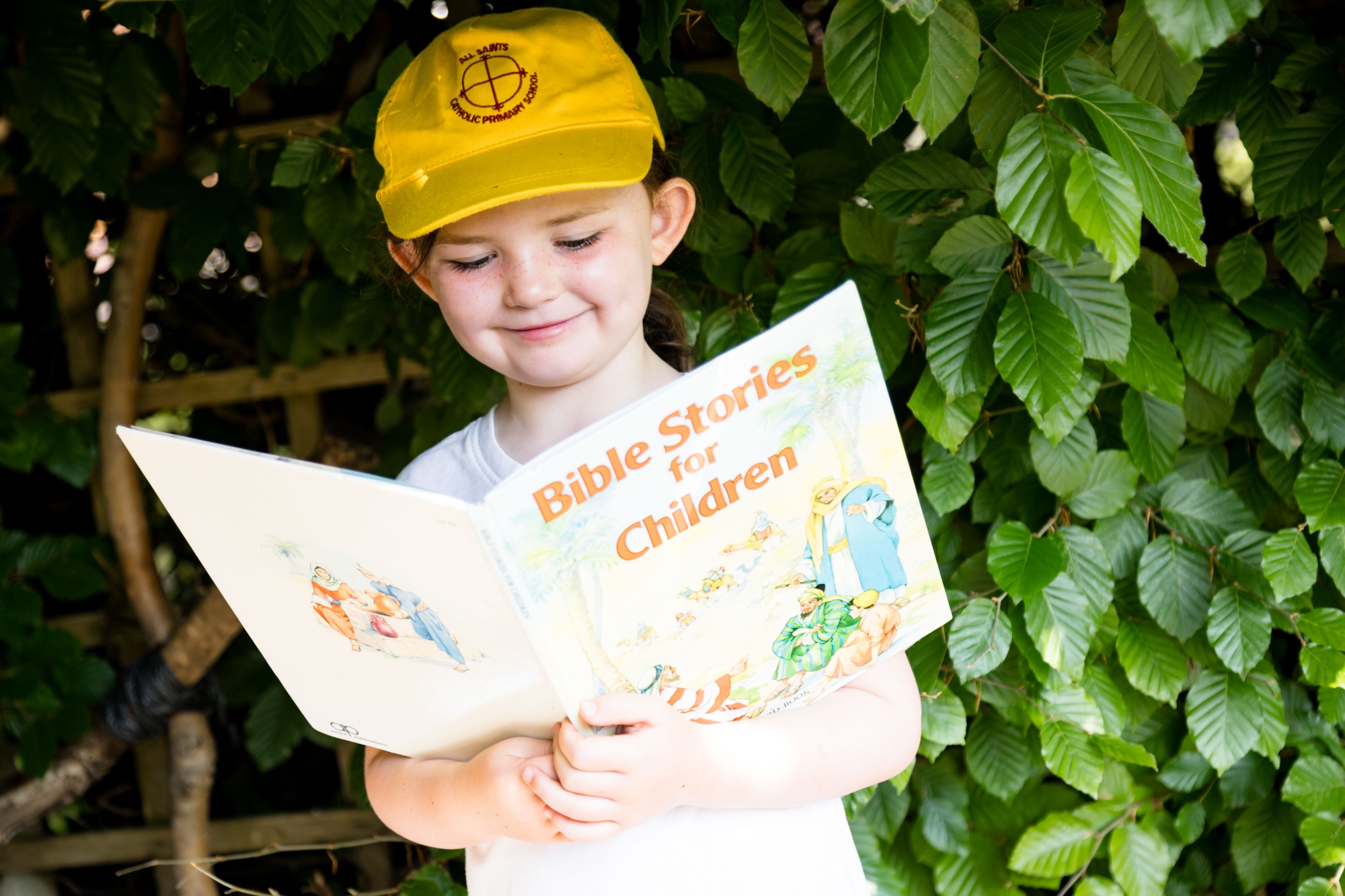
Assessment and Recording
The assessment of Religious Education at our school is designed to assist our children's learning and to enable them to strive for a feeling of confidence and success in their understanding of the Catholic Faith. Progress is monitored through discussion, questioning, posing problems and giving opportunities to present their knowledge to others in a variety of ways, e.g. class prayer service. Assessments are completed at the end of each half term to show children's levels of understanding. Teachers will assess using teacher assessment, as with Writing and with other Foundation Subjects using age-related expectations rather than levels and sub-levels. This will consist of WTS (Working Towards Standard) and EXS (Expected Standard)
The RE Co-ordinator is part of the Romero Hub- a cluster of local RE Co-ordinators- which allow co-ordinators to share good practice and seek support.
The RE Co-ordinator also maintains close links with the RE Co-ordinators at St, Margaret Ward and Our Lady of Lourdes. Our schools make up three Parishes served by our Priest. Regular meetings take place.
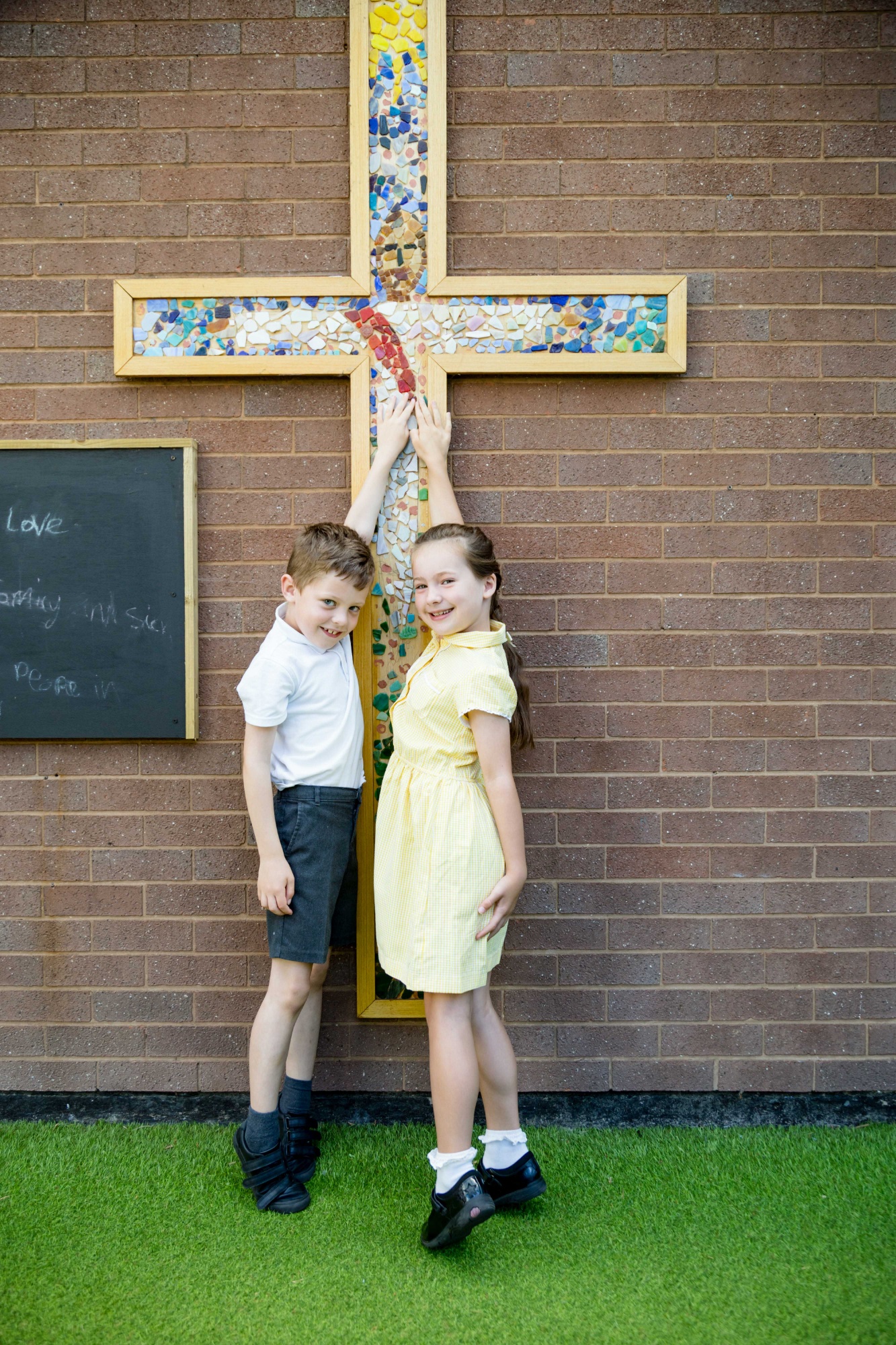
Marking
In line with the school's marking policy, marking of children's religious work should always be positive and supportive to encourage the child in his/her faith journey. Marking will focus upon religious content and comments, feedback and next steps given will look to enhance religious skills, knowledge and understanding, rather than Literacy skills of spelling, grammar and punctuation. However, inaccurate spelling of important religious key words will be corrected within the children’s books.
Vocabulary
Key words and vocabulary will be displayed prominently in the classroom and in books, children will be encouraged to use these effectively and purposefully throughout each lesson, particularly in their written work.
Monitoring and Moderation
The RE Co-ordinator monitors planning, teaching and assessment of RE. This is done through Learning walks, lesson observations, scrutiny of work, scrutiny of planning, assessment and moderation. Tracking Data is analysed by the RE Co-ordinator. The RE Co- ordinator meets with the RE Co-ordinators for each of the three Parish schools to share good practice, which includes discussion of moderation. Progress and achievement in Religious Education is reported to parents/carers in a written report at the end of each academic year
Home Links
The school recognises that it cannot teach our children without the cooperation of the parents and the parish. The parents/guardians are the first educators and they support the teachers who have the professional skills and training to help parents in the task of teaching the Catholic faith. We endeavour to do this in an atmosphere of trust and confidence. During the year, parents and friends are invited to join us at many celebrations. Parents are always invited and welcomed to all our school and class celebrations which include school Masses, class Masses, stay and pray sessions, Christmas and Easter productions and morning prayer sessions. Class teachers detail each Religious branch or unit in half termly topic webs or newsletters to keep parents informed.
Parish Links and the Wider Community
We recognise that the school stands in the midst of the local community. At Parish level, we take an active part in the Parish life of the church. Sunday Sacramental Programme Masses are planned by the RE Co-ordinator and all staff participate. All staff participate in First Holy Communion Mass and First Forgiveness Service.
Sunday Community Masses are planned by the RE Co-ordinator and led by the children. Children, families and staff also attend Masses such as the Sunday ‘Blessing of the School Bags’ Mass.
In addition, classes from Reception, KS1 and KS274 plan and attend regular Masses at Church throughout the year and on Holy Days of Obligation. The Parish Priest, Father Ned Wall is a governor of the school. He promotes the spiritual life of the school and leads the celebration of liturgies, Mass, penitential services, and the other liturgical feasts and celebrations during the year. He also teaches pupils the traditions and rituals of the Church and the Church is often used for such lessons.
All Saints’ School is in integral part of a much larger Parish Community-stretching beyond its locality into homes, the Parish and wider world. Children and their families are encouraged to be aware of the wider community at every level. Regular newsletters inform parents and carers about their children’s RE topics. Parents and carers are informed of all school celebrations, including Masses and assemblies. Parents are invited to participate in events such as the Holy Week trail and Crowning Our Lady. They pray at home, using the Lenten and Advent prayer bags. Families are involved in donating food for the local Food Bank and toys for the Manchester Wood Street Mission project. The Sacramental Programme further strengthens the links with families, as school leads the program and are involved at every stage. At All Saints’, the children are invested in their local community- for example - singing at local care homes and in Ashton Village and giving hampers to the housebound during Advent. Mini Vinnies positively promote their message of ‘turning concern into action’, through their events. New opportunities to make positive links locally, are always being investigated.
The school’s website also share the integral role of RE in our daily lives.
Supporting our global community takes place through fund raising, for example for CAFOD. All Children are encouraged to ‘live’ their Faith, through various events, such as fundraising for CAFOD and Missio by being aware of world events. Children are informed through learning about global concerns as part of the curriculum, visitors to school, educational resources from CAFOD and Mission Together and Laudato Si.
Catholic Social Teaching in the Life of All Saints’ School
Catholic Social Teaching (CST) is central to the Religious Education and wider mission of our school, underpinning the values we seek to cultivate in every pupil. Rooted in the Gospel and the dignity of the human person, CST invites children to live out their faith through action, compassion, and justice. At All Saints’, we embed these teachings through liturgical seasons, feast days, and practical faith-in-action projects that shape pupils as responsible citizens and followers of Christ. Themes such as Stewardship, the Preferential Option for the Poor, Human Dignity, and Solidarity are lived experiences across the year—whether through environmental stewardship in our eco garden, caring for the vulnerable via food drives and Christmas hampers, or promoting peace and participation through leadership roles and community prayers. These values not only deepen children’s spiritual development but also equip them to engage with the world in a meaningful and loving way, inspired by the example of Jesus Christ and the Saints. See RE Provision Map
Prayer and Liturgy (See P&L Policy)
To love You more dearly – The Prayer and Liturgy Directory for Catholic Schools and Academies in England and Wales.
The aim of the Prayer and Liturgy Directory (PLD) is to assist school communities in their endeavours to implement the vision of the Church for prayer and liturgy within their local setting. An essential part of the Catholic ethos of the school is the prayer life. The most important aspect of prayer for children is that they realise it is their way of communicating with God. Children are encouraged to pray in different ways according to their age and personal development. We have developed a prayer progression model for children as they move through the school. Children are introduced to a variety of different ways of praying:
- quiet reflection / meditation
- praying together
- writing own prayers
- prayers through music
- learning traditional Christian / Catholic prayers
Staff are encouraged to pray with children, and to be an example for them. Through prayer, we endeavour to develop our relationship with God. All classes have a prayer area which has displays of children's work. This area changes with the liturgical year. School and Common prayers are established throughout the school and each teacher uses prayers set within their specific Key Stage bracket, as identified by the PLD. Further opportunities for prayer are used through our weekly Celebration of the Word gathering as a whole school, as well as using this to reinforce the common prayers expected to be known throughout the school. Candles, pictures and objects are also used as a focus for prayer. Children take part in whole school assemblies where children and staff join together to pray. Children are encouraged to pray their own prayers. Each class has their own prayer book. During Advent and Lent, a special Prayer Bag or Box is sent home to a different family each night.
Prayer
An essential part of the Catholic ethos of the school is the Prayer Life. We acknowledge the legal requirement that there must be a daily act of worship for all pupils. The act of worship is distinct from R.E. lessons. It forms an integral part of school life and is central to Catholic tradition. Staff meetings and Governor’s meetings begin with a prayer. The most important aspect of prayer for children is that they realise it is their way of communicating with God. Pupils are encouraged to prepare and lead Prayer sessions in their classrooms and for whole school gatherings and assemblies as appropriate. The Year 6 Chaplains and Faith Leaders model and promote their role as Prayer Ambassadors seriously.
Staff are encouraged to pray with children, and to be an example for them. Through prayer, we endeavour to develop our relationship with God. All classes have a prayer focus area which has displays of children's work. This area changes with the liturgical calendar and is prepared to reflect the appropriate liturgical colour. Class prayers are established throughout the school and each teacher uses prayers appropriate to age and ability of the class. A bible should be on display. Each classroom should also have a crucifix as a focal point. Candles, pictures and objects are also used as a focus for prayer. Prayer areas are also found in other areas of the school. Children are also encouraged to take time to reflect and pray. The school Prayer Garden is a special, very distinct area used for individual and group prayer, including use by the school prayer group and Mini Vinnies.
Children take part in whole school Celebration of the Word assemblies where children and staff join together to pray. Children are encouraged to pray their own prayers. Classes have daily / weekly acts of prayer and worship including pupil-led liturgy.
Prayer Leaders
Prayer Leaders are pupils chosen to help guide, support, and enrich the prayer and liturgical life of their class and school community. Their role is to encourage their peers to develop a closer relationship with God, to take responsibility for preparing and leading acts of prayer and worship, and to act as witnesses to the Catholic faith in everyday school life. This role reflects our school mission to form children as disciples of Christ who live out Gospel values in Kindness, Forgiveness Working Together and Trying Our Best.
Prayer Leaders lead and supporting Prayer by
- Leading daily prayers in the classroom (morning prayer, grace before meals, and end of day prayer).
- Helping to prepare and lead class prayer times and Celebrations of the Word.
- Encouraging their peers to take part in prayer respectfully and meaningfully.
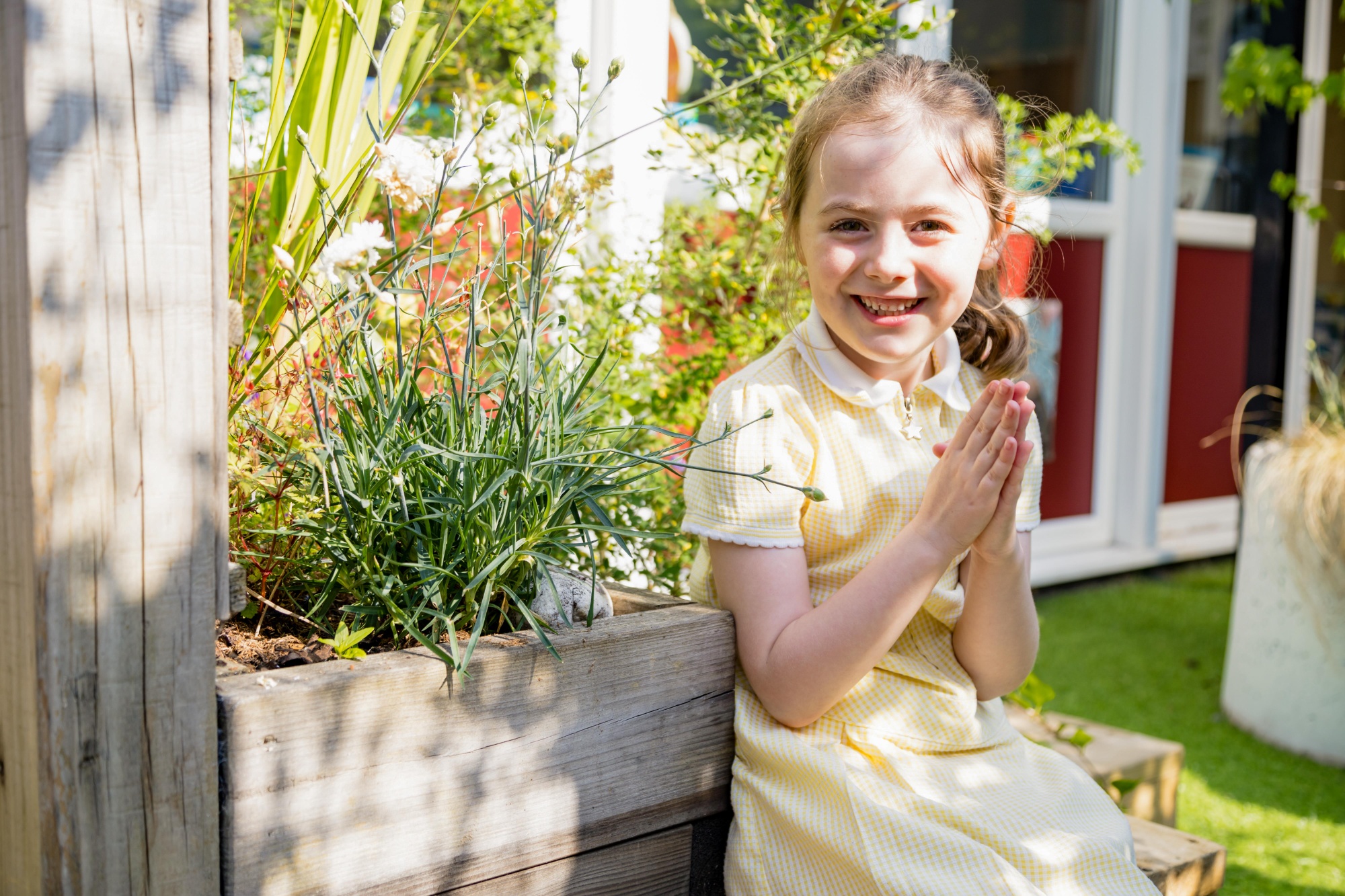
Celebration of the Word
Celebration of the Word take place weekly led by the Headteacher or Deputy Head. A weekly celebration assembly is also used as an opportunity to reflect on the school’s mission statements and celebrate how the children have ‘lived’ or seen the mission statements in action during the week.
In addition, each class, in turn leads a class Prayer Service.
Mass
Mass is an integral part of school life. Each class, throughout the school, leads Masses. Whole school Masses are also planned, which involve the participation of some children from all classes. All Masses take place in church. Families and parishioners are invited to Masses. All are invited back to school for refreshments, after Mass.
Year 6 Faith Leaders and Chaplains help teachers organise Mass resources. Y6 school leaders organise hymn books, sit with younger children and the Performing Arts group lead regularly children in singing. Holy Days of Obligation and special feast days are always honoured. Special events are celebrated with Mass- such as Year 6 Leavers’ Mass, staff retirement Masses.
Events during the Liturgical Year are also celebrated through services which take place in Church and school. These include:
- Harvest/ CAFOD
- October Rosary
- Advent
- Christmas
- Lent/CAFOD
- Stations of the Cross
- Holy Week
- Easter
- Ascension
- Pentecost
- Crowning Our Lady
- May Rosary
- Sacred Heart
Prayerful Singing and learning about The Mass
Prayerful Singing is also a time of prayer. The children are taught hymns to be sung during the various rites of the Mass and for the seasons of the Liturgical calendar.
An important element of these sessions is the opportunity to support further learning about the Mass by exploring various elements of the Mass, explaining and teaching responses and addressing special days in the Liturgical Calendar. Hymns or songs are sung for the pure joy they give and are presented as a form of prayer. The meaning of a hymn is also explained to ensure that the children fully understand their message.
Sacramental Preparation
The children are prepared for the Sacraments of Reconciliation and First Holy Communion from Year 3. The course of preparation is carried out by the RE Co-ordinator after school and works in close consultation and partnership with Fr Ned. Children of the Parish, who do not attend a Catholic school, are invited to take part in the programme and are warmly included in all aspects.
The Sacramental Programme is planned in conjunction with the Parish Priest, the Head Teachers and RE co-ordinators of our three Parish schools- All Saints’, St Margaret Ward and Our Lady of Lourdes. All attend parental sacramental meetings. Strong support from parents is encouraged throughout the programme. Staff support is always available to address any questions parents may have.
We hope to achieve true partnership between school, family and parish, with the children celebrating their First Communion at All Saints’ Church.
Multi-Cultural and Multi-Faith
All Saints’ is a Catholic school that encourages tolerance, respect and care for all people, regardless of culture, nationality, disability, gender or creed. While Religious Education is specifically the Catholic tradition, we welcome input from other faiths and denominations. We appreciate how the beliefs and values of other faith communities can enrich our own spiritual existence. During the Summer term, teaching and learning time is given to teaching Judaism and Islam and other faiths are studied at key festival periods during the year.
Conclusion
We believe that this policy forms an integral part in the life of our Catholic primary school. We believe this policy is a living one, reflecting the school Mission Statements and enabling us to develop the spiritual and pastoral life of our children. This policy will be subject to review at regular intervals in order to ensure and continue quality teaching, learning of Religious Education in this school. This will enable our children ‘to reflect spiritually, and think ethically and theologically, and who are aware of the demands of religious commitment in everyday life.’ Policy to be reviewed annually.

